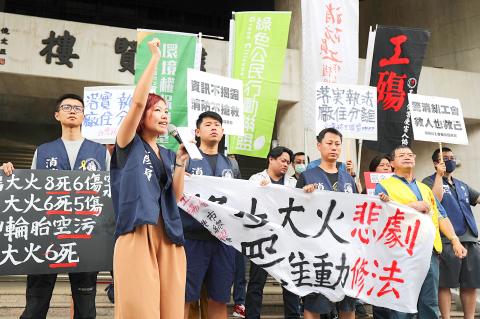A coalition of labor and environmental groups yesterday protested outside the Legislative Yuan in Taipei to demand that the government pass laws requiring factory owners to inform the government, fire departments and area residents of hazardous chemicals stored at their factories.
The protest began an hour after the legislature’s Social Welfare and Environmental Hygiene Committee began a meeting to review current policies on chemicals control and disaster prevention in the wake of last month’s fire at a Chin-Poon Industrial Co factory in Taoyuan that killed six firefighters and two Thai employees.
Representatives of the National Association for Firefighters’ Rights, the Migrants Empowerment Network in Taiwan (MENT), the Green Citizens’ Action Alliance and other groups called on the government to increase protection for firefighters, people living near chemical factories and the environment.

Photo: CNA
Last month’s fire took a heavy toll on the Taoyuan Fire Department because the firefighters were given limited information on the hazardous chemicals stored at the factory before going inside, association advisor Cheng Ya-ling (鄭雅菱) said.
“Although the Ministry of the Interior has promised to increase inspections of factory chemicals, it has not explained how it could possibly do so given that fire departments nationwide face a personnel shortage estimated to be at 50 percent,” she said.
The majority of firefighters are overworked, given 360 to 480 hours a month with a schedule of “a 24-hour shift every other day,” or “a 48-hour shift after every rest day,” she said.
“How could the government carry out more safety inspections without further overworking them, especially in areas with lots of factories such as Taoyuan and Hsinchu?” Cheng said.
Besides finding ways to improve factories’ management of their chemicals, the government should also require factory owners to inform fire departments of hazardous substances in their factories and their locations, as well as sending personnel to assist firefighters at the scene, she said.
“Factories should be fined if they fail to do any of the above and they should be subject to criminal penalties if a fire causes deaths,” Cheng added.
Fires at factories in the past several months have killed not only firefighters, but several migrant workers, MENT representative Wu Ching-ju (吳靜如) said.
Migrant workers should not be living in dormitories connected to factories, she said.
“Those forced to live at factory complexes continue to be exposed to dangers they face at work. This also increases the risks for firefighters, who must rescue those trapped in dormitories,” Wu said.
The government must work with local communities to establish detailed criteria for determining what information regarding public hazards factories should be required to give to nearby residents, including lists of hazardous substances stored at such facilities, Green Citizens’ Action Alliance deputy secretary-general Hung Shen-han (洪申翰) said.
Residents have the right to know and the Environmental Protection Administration’s Toxic and Chemical Substances Bureau should establish a mechanism to give the public access, he said.
“I hope the government can understand what firefighters, migrant workers and residents who live near factories really need,” National Association for Firefighters’ Rights secretary-general Chu Chih-yu (朱智宇) said.
“When government officials show up for the firefighters’ memorial service on Thursday, they should come with concrete plans for reforming chemical control regulations, not vague promises,” he said.

Taiwanese can file complaints with the Tourism Administration to report travel agencies if their activities caused termination of a person’s citizenship, Mainland Affairs Council Minister Chiu Chui-cheng (邱垂正) said yesterday, after a podcaster highlighted a case in which a person’s citizenship was canceled for receiving a single-use Chinese passport to enter Russia. The council is aware of incidents in which people who signed up through Chinese travel agencies for tours of Russia were told they could obtain Russian visas and fast-track border clearance, Chiu told reporters on the sidelines of an event in Taipei. However, the travel agencies actually applied

New measures aimed at making Taiwan more attractive to foreign professionals came into effect this month, the National Development Council said yesterday. Among the changes, international students at Taiwanese universities would be able to work in Taiwan without a work permit in the two years after they graduate, explainer materials provided by the council said. In addition, foreign nationals who graduated from one of the world’s top 200 universities within the past five years can also apply for a two-year open work permit. Previously, those graduates would have needed to apply for a work permit using point-based criteria or have a Taiwanese company

The Shilin District Prosecutors’ Office yesterday indicted two Taiwanese and issued a wanted notice for Pete Liu (劉作虎), founder of Shenzhen-based smartphone manufacturer OnePlus Technology Co (萬普拉斯科技), for allegedly contravening the Act Governing Relations Between the People of the Taiwan Area and the Mainland Area (臺灣地區與大陸地區人民關係條例) by poaching 70 engineers in Taiwan. Liu allegedly traveled to Taiwan at the end of 2014 and met with a Taiwanese man surnamed Lin (林) to discuss establishing a mobile software research and development (R&D) team in Taiwan, prosecutors said. Without approval from the government, Lin, following Liu’s instructions, recruited more than 70 software

Taiwanese singer Jay Chou (周杰倫) plans to take to the courts of the Australian Open for the first time as a competitor in the high-stakes 1 Point Slam. The Australian Open yesterday afternoon announced the news on its official Instagram account, welcoming Chou — who celebrates his 47th birthday on Sunday — to the star-studded lineup of the tournament’s signature warm-up event. “From being the King of Mandarin Pop filling stadiums with his music to being Kato from The Green Hornet and now shifting focus to being a dedicated tennis player — welcome @jaychou to the 1 Point Slam and #AusOpen,” the